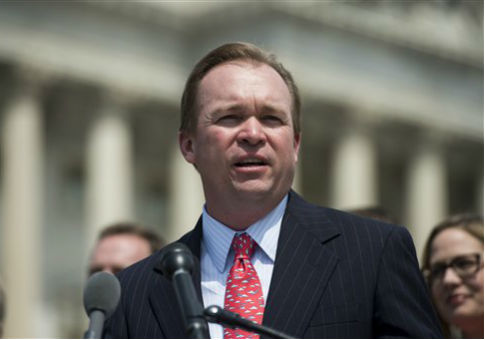A Republican congressman scheduled to host a briefing on Thursday with a far-left Democratic lawmaker and national security groups supporting defense cuts has pulled out of the event, according to a spokeswoman.
Rep. Mick Mulvaney (R., S.C.) was featured on an invitation as a co-host for a briefing on the Pentagon’s fiscal year 2016 budget request along with Rep. Keith Ellison (D., Minn.). The briefing was advertised as featuring remarks by national security organizations, including the National Security Network and the Center for Arms Control and Non-Proliferation, that back reductions to defense spending.
Mulvaney, a member of the House Budget Committee, has developed a reputation as a deficit hawk willing to curtail both domestic spending and the Defense Department’s budget—a stance that has landed him in hot water with other conservative lawmakers and defense hawks.
However, Mulvaney spokeswoman Stephanie Faile said in an email that he will not be at the event. She did not respond to further requests for comment on why he will not attend an event he was advertised as hosting, or when he decided not to do so.
The Pentagon released its budget request for 2016 on Monday, which included $534.3 billion in base funding and $50.9 billion for overseas contingency operations (OCO). That level of funding would represent an increase of $24.9 billion compared to the 2015 budget, and would lift defense spending above the $499 billion cap set by cuts known as sequestration. The Center for Arms Control and Non-Proliferation immediately panned the proposed boost to the Pentagon’s budget.
Mulvaney’s commitment to reining in spending, even at the expense of funding for national security, has previously incurred the ire of constituents in his South Carolina district. The Washington Post reported in May 2013 that South Carolinians affiliated with Shaw Air Force Base in his district faced difficult circumstances as a result of budget cuts he supported. More than 1,000 civilian workers were furloughed, and the Air Force was forced to reduce flight-training hours for F-16 fighter jets and completely ground another squadron.
Mulvaney met with a two-star general at the base when he visited his home district in 2013. "The general said he had never seen his Air Force less ready for combat," the Post reported.
Mulvaney replied that, "If the cuts force us to look for better ways of saving money in the future, they will be a success. We can’t go backwards."
The Post also noted that Mulvaney "believes he’s a new kind of Republican—the kind who has been willing to team up with the likes of then-Rep. Barney Frank (D-Mass.) to freeze defense spending."
A GOP aide said Mulvaney has long been representative of the libertarian, noninterventionist branch of the Republican Party—a group of members willing to cut any type of spending, including defense, at all costs.
"He is the high priest of the Jane Fonda wing of the Republican Party," the aide said.
Sen. Rand Paul (R., Ky.), the most high-profile noninterventionist in the GOP and a potential 2016 presidential candidate, campaigned for Mulvaney’s re-election last year.
Mulvaney’s views on defense spending also contributed to his defeat in the race to lead the conservative Republican Study Committee (RSC), the Free Beacon reported in November 2014.
The national security groups scheduled to attend the Thursday briefing all have ties to liberal organizations and advocate for smaller defense budgets. The National Security Network describes itself as a group that brings "cohesion and strategic focus to the progressive national security community."
The Center for Arms Control and Non-Proliferation is funded by liberal arms control foundations such as the Ploughshares Fund. Its sister nonprofit advocacy organization, the Council for a Livable World, has donated about $3.2 million to Democratic candidates since 1989 and bundled contributions for lawmakers such as former Sen. Russ Feingold (D., Wisc.) and Sen. Elizabeth Warren (D., Mass.).
The GOP aide said the groups were an assemblage of "radical leftists."
"If you spent one cent on the Defense Department, they would try to get that one cent cut," the aide said. "And frankly Republicans have no business interacting with them."
Another host of the event, the National Taxpayers Union, has previously expressed support for defense cuts as a part of sequestration.
Mulvaney has partnered before with Ellison, the Democratic lawmaker invited to the briefing. Both organized a letter from 24 lawmakers in December 2012 that urged President Obama and congressional leaders to find "defense savings in any final budget agreement." Ellison has made a number of bizarre statements in the past that have raised eyebrows among conservatives, including his 2010 speech to the Network of Spiritual Progressives Conference in which he expressed the hope that national borders will one day become "irrelevant."
The military’s service chiefs warned members of the Senate Armed Services Committee last week that sequestration—which will total about $1 trillion in defense cuts in the next few years unless repealed—is hampering the readiness of a smaller force and further delaying modernization of aging equipment.
In its long-term budget outlook, the Congressional Budget Office (CBO) projected last month that defense spending would shrink to its lowest percentage of GDP in decades by 2025—if spending stays on the current trajectory. Spending on health care programs and interest payments, by contrast, would consume larger portions of the federal budget.
